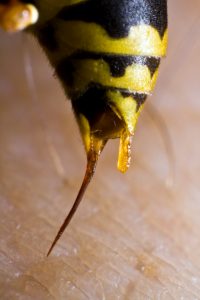Allergies to Bee Stings and Other Venoms Can Be Serious: Learn How to Stay Safe
 No one enjoys being exposed to a sting or bite from a venomous insect. Whether a bee, wash, yellow jacket, or wasp, typical symptoms to venom exposure include pain, irritation, and bumps at the site of the sting. However, there are some people for whom bee stings can be a much more serious issue. If you’re one of those people, or suspect that you may be, read on to learn how you can avoid stings and venom and then reach out to Allergy, Asthma, and Immunology Medical Group at 805-658-9500 to speak with an allergist who can help.
No one enjoys being exposed to a sting or bite from a venomous insect. Whether a bee, wash, yellow jacket, or wasp, typical symptoms to venom exposure include pain, irritation, and bumps at the site of the sting. However, there are some people for whom bee stings can be a much more serious issue. If you’re one of those people, or suspect that you may be, read on to learn how you can avoid stings and venom and then reach out to Allergy, Asthma, and Immunology Medical Group at 805-658-9500 to speak with an allergist who can help.
Anaphylaxis is a life-threating issue
If you do have a more serious reaction to venom, that reaction is known is anaphylaxis. It can result in difficulty breathing, tightness in the chest, passing out, a swollen tongue and / or throat, vomiting, dizziness, and other symptoms. A serious attack can be deadly.
Tips to avoid a bee sting
You do want to go out and live your life but you don’t want to put your health at risk. While it’s not possible to be 100% confident that you won’t get stung by a bee if you spend time outside, there are some things you can do to protect yourself. First of all, try not to eat or drink outside. Food and beverages can both attract insects. If you do have to eat outside, only use containers with tight-fitting lids and keep them covered when you’re not actively eating.
Make sure that any outdoor garbage cans have lids and that the lids are in place when the can isn’t being used. Skip wearing bright colors or standing by bright colors. Essentially, remember that brightness attracts insects who feed on the pollen of flowers. If you do see a flying insect, stand still. Don’t swat because, depending on what type of insect it is, the swatting could make it more aggressive and more likely to sting you.
What to do if you do get stung
First and foremost, try to stay calm. You want to get the stinger out as soon as possible. Ideally you’d get it out in less than 30 seconds to prevent more venom from coursing through your system. Never use tweezers to get it out, because tweezers can put pressure on the sac of venom and cause it to be released into your body. Elevate the place you were stung, put ice on it, and then add a topical anti-itch cream or take an oral antihistamine.
If you do have an allergy to bee stings, then you should always have your auto injector. Don’t hesitate to use it if you believe that you’ve been stung. If you develop symptoms of being stung, get to the doctor as soon as possible. We also recommend that you visit Allergy, Asthma, and Immunology Medical Group at 805-658-9500 before you get stung. We can assess your allergy and help find alternative ways to treat it. You are in good hands – call us today.



